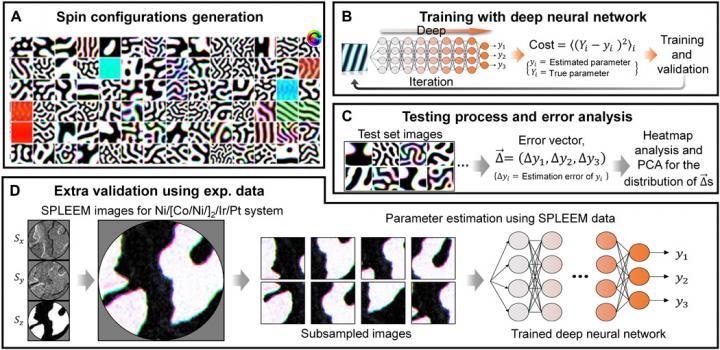Dec 17 2020
Spintronics is actively studied to overcome the drawbacks of the integration level of silicon semiconductors that are in use at present and to develop ultra-low-power and high-performance next-generation semiconductors.
 (A) Data generation process showing the sampled spin configurations generated through the simulated annealing process. The color wheel indicates the in-plane magnetization directions, and the grayscale indicates the out-of-plane magnetization directions. (B and C) The training and testing processes used in this study. (D) The additional validation process with experimentally observed magnetic domain images. Image Credit: Korea Institute of Science and Technology (KIST).
(A) Data generation process showing the sampled spin configurations generated through the simulated annealing process. The color wheel indicates the in-plane magnetization directions, and the grayscale indicates the out-of-plane magnetization directions. (B and C) The training and testing processes used in this study. (D) The additional validation process with experimentally observed magnetic domain images. Image Credit: Korea Institute of Science and Technology (KIST).
The field of spintronics deals with the intrinsic spin of electrons and the area of electronic engineering.
Magnetic materials are most widely used to create spintronics devices like magneto-resistive random-access memory (MRAM). Hence, it is necessary to find out precisely several properties of the magnetic materials, like dynamic behaviors, thermal stability and the ground state configuration, by analyzing the magnetic Hamiltonian and its parameters.
Previously, the magnetic Hamiltonian parameters were quantified directly via several experiments to achieve a more precise and deeper insight into the properties of magnetic materials and such processes would need a huge amount of resources and time.
To address such restrictions, an artificial intelligence (AI) system has been developed by scientists in South Korea with the ability to examine magnetic systems in a moment.
According to the Korea Institute of Science and Technology (KIST), the collaborative research team under the guidance of Dr. Heeyong Kwon and Dr. Junwoo Choi from Spin Convergence Research Center and Professor Changyeon Won from Kyung Hee University devised a method for calculating magnetic Hamiltonian parameters from spin structure images by making use of AI methods.
They built a deep neural network structure and trained it using machine learning algorithms and magnetic domain images that are already available. Thus, the magnetic Hamiltonian parameters could be evaluated in real time by inputting spin structure images acquired from electron microscope.
Moreover, the estimation errors of the AI system were below 1% when compared to the experimentally analyzed parameter values, which signifies high estimation accuracy.
The researchers report that the newly developed AI system can complete material parameter estimation process in a moment, which earlier required tens of hours, by making use of deep learning methods.
We presented a novel approach on how AI technologies can be implemented to analyze the properties of magnetic systems. We expect that new methods for studying physical systems using such AI technologies will be able to reduce the gap between experimental and theoretical aspects, and will further lead to expanding a new research field called convergence of AI technology and fundamental science research.
Dr Hee-young Kwon, Korea Institute of Science and Technology
This study was performed with a grant from the Ministry of Science and ICT (MSIT), as part of the Institutional R&D Program of KIST, and Basic Science Research Program supported by the Ministry of Education.
Journal Reference
Kwon, H. Y., et al. (2020) Magnetic Hamiltonian parameter estimation using deep learning techniques. Science Advances. doi.org/10.1126/sciadv.abb0872.